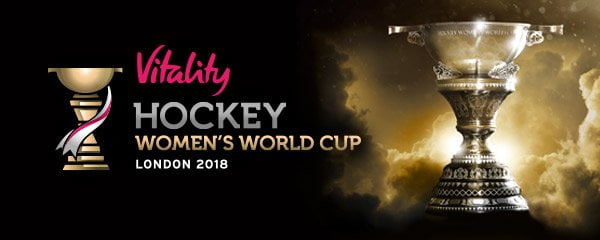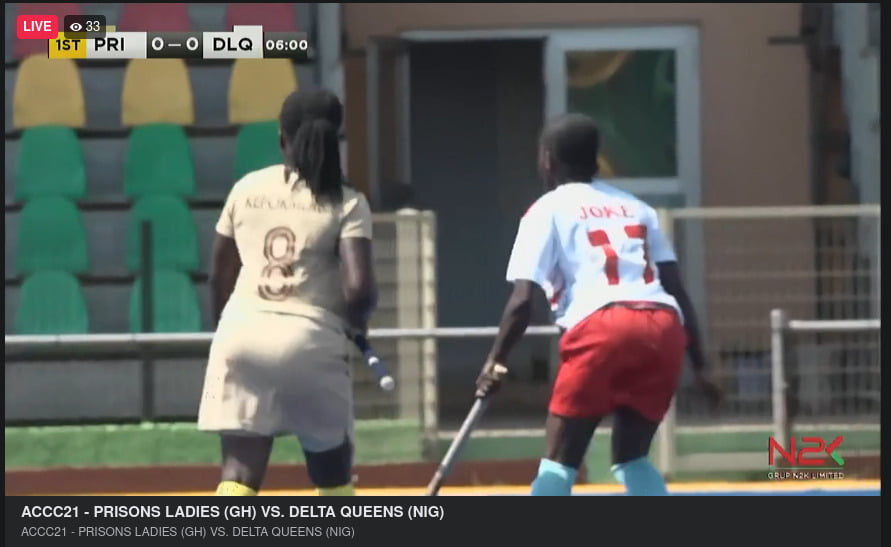1 August 2018
Spain through to semi-finals against Ireland or Inda after late winner over Germany
Australia win sets up date with Netherlands or England
A new nation will be among the finalists
London: The surprises just keep coming. This time it was Spain who claimed a higher ranked scalp at the Vitality Hockey Women’s World Cup, London 2018 as they beat Germany 1-0.
“If you don’t score, you don’t win,” was the simple summing-up statement of a clearly hugely disappointed Head Coach Xavier Reckinger.
In the second match, a marathon between two heavyweights in world hockey, Australia finally won out in the shoot-out to destroy Argentina’s hopes of winning a third World Cup.
For Spain the 1-0 win means a first appearance in a World Cup semi-final since Madrid 2006. Then they faced Australia, losing 1-0 after extra time. This time they will face either India or Ireland. The result of that match means there will be a new nation guaranteed to be among the medals.
In the first quarter final of the evening, Germany (FIH Hero World Ranking: 6) played their European rivals Spain, who are ranked five places lower. It was a game where the big names in each team really needed to step up and lead from the front.
Marie Mävers was first to almost get on the score-sheet as she struck the ball across the face of Maria Ruiz’s goal. The German pressure was rewarded by a penalty corner in the third minute but Ruiz was equal to the challenge.
It was not one way traffic however. While Germany were swinging the ball around and seeking opportunities to release their speedy forwards, Spain were always looking for their own opportunity to break. Berta Bonastre showed her tremendous ability as she reached to interrupt a German pass. Her subsequent pass was just out of reach of its intended target, Alicia Magaz, who was playing her hundredth match for Spain.
This was a to-and-fro game with occasional bursts of exhilarating skill from individuals. One of the most exciting players at this World Cup has been Charlotte Stapenhorst and, again, she didn’t disappoint. Her run up the pitch, from deep inside her own defending area left a trail of defenders behind. Her shot, hit mid-height with venom, was well saved by Ruiz.
Another player who has impressed throughout the tournament is Selin Oruz. Like Stapenhorst, she burst deep out of defence and was goal bound until a timely tackle from Rocio Gutierrez stopped her in her tracks.
Janne Muller-Wieland used all her vast experience to prevent Miailen Garcia from entering the circle when a break down in the German attack left the world number six side exposed in defence. Where many people would have committed a foul in that position, Muller-Wieland’s tackle was as clinical as it was timely. In the final quarter, there was still no separating the teams.
Spain were playing the more aggressive hockey and this prevented Germany playing their usual fast-moving game. Spain won their first penalty corner and Perez was very close to giving her team the lead.
The decisive strike came in the 54th minute. Carmen Cano was the hero who put Spain through to the semi-finals of the World Cup after she cleverly batted a midair ball past Julia Ciupka.
Spain then had to withstand six minutes of German pressure, something that was intensified when Carlota Petchame was sent from the field with a yellow card.
A relieved but ecstatic Berta Bonastre said: “There were no stars out there today, we all played for each other. We have worked so long for this and all too often it is ‘we are making progress’, but tonight all our hard work paid off.”
Charlotte Stapenhorst echoed her coach’s words when she spoke of the need to convert chances to goals. “Spain gave us no space to play our game, so we needed to take chances when we could. That didn’t happen tonight and then one moment of switching off and they scored. That is quarter-final hockey.”
It took 60 minutes of hockey and a further 14 shoot-out attempts to discover who would be heading to the semi-finals and a meeting with the Netherlands or England.
World number three team Argentina and the world number five team Australia have always been well-matched but in this quarter-final it seemed nothing could separate them. They have both won the World Cup twice, they have long occupied a place within the top five in the world, they both have iconic players in their glorious hockey history and neither side can stand losing.
There is little to separate Australia and Argentina at the best of times and the quarter final of the Vitality Hockey Women’s World Cup was the best example of how neither team will ever give an inch.
Australia’s defence over this World Cup has been good, only conceding three goals, while Argentina had been 135 minutes without conceding a goal, so scoring opportunities on the part of both teams was always going to be limited.
In the first quarter, both teams were testing each other out, which made for a cagey and defensive first 15 minutes. There were forays into each other’s goals but on the whole neither Belen Succi or Rachael Lynch were called into action much.
Australia always knew that scoring past Belen Succi and her defence would be a tough ask and so it proved. Just how defensive these two teams were playing is encapsulated in the statistics. By the end of 30 minutes of play, there had been two shots from Australia and four from Argentina.
Neither side, aware of the threat of Australia’s Jodie Kenny and Argentina’s Noel Barrionuevo, had conceded any penalty corners.
The second half saw both teams start to explore the attacking options a little less tentatively. Ambrosia Malone and Renee Taylor both had shots that tested the Leonas defence, while Delfina Merino, Agustina Albertarrio and the effervescent Maria Granatto all forced some brave defending from the Hockeyroos.
A run by Julieta Jankunas looked dangerous but was dealt with by the rock steady Australian defence, where Vitality Player of the Match Georgina Morgan was one of the stars.
At the other end Kathryn Slattery showed her agility in front of goal when she spun and shot, bringing a great reaction save from Succi. There was an instant counter-attack as Rocio Sanchez weaved her way through the Australia defence, only to be met by the barrier that is Lynch.
A great referral for a stick check was called by Martina Cavallero to earn Argentina their first penalty corner but they faced a defensive unit that was not going to give an inch. Led by Jodie Kenny and Maddy Fitzpatrick, who were both excellent throughout the match, the Hockeyroos looked unassailable as the Argentina attack tried to prise the defence open.
Argentina were in the ascendency and looking the more likely to score when a breakdown by Edwina Bone released Slattery. She drew a penalty corner and Jodie Kenny and Goergina Morgan both set up to strike. Kenny’s rasping shot was chased down by the Argentina defence and Las Leonas were able to relieve the pressure.
A speedy run by Lucina von der Heyde looked dangerous but again, the Hockeyroos stood firm. At the other end of the pitch, Brooke Peris was creating problems with her own attacking running. If the Hockeyroos were strong and tall, so the Argentina defence were equally hard-working and proving impossible to break down.
The game moved to shoot out and it took another 14 attempts and much drama to find a winner. Both Succi and Lynch were heroic in goal, Merino thought she had scored but was timed out, there was a penalty stroke after Succi brought Kenny down. In the end it was gladiatorial as Brooke Peris faced Succi. The Australian held her nerve and scored, and seconds later she was mobbed by a sea of yellow shirts.
Speaking after the game, scorer of the winning goal, Brooke Peris said: “I just had a plan and I knew what I had to do. I am so proud of our performance.”
“We knew we had to keep a really strong defence,” added Edwina Bone. “And then we have someone like her [Rachael Lynch] on our side and she was brilliant tonight.”
The match was also a special moment for Belgium umpire Laurine Delforge who officiated her 100th senior international.
Results:
Germany v Spain 0-1
Australia v Argentina 0-0 (Australia win shoot out 4-3)
Quarter finals taking place on Thursday 2 August
18:00: India v Ireland
20:15: Netherlands v England
After an agreement was reached between BT Sport and RTÉ, Ireland’s match vs India will also be live on RTÉ2
#HWC2018
ENDS
Notes for Editors
On-site Media Contact:
Sarah Juggins
FIH Media Operations Manager
sarah.juggins@fih.ch
Ph: +44(0)781 2525310
FIH World Ranking Points at the Vitality Hockey Women’s World Cup:
As the Vitality Hockey Women’s World Cup, London 2018 enters the cross-over and quarter finals stage, here is an explanation of how ranking points will be awarded.
The teams that finish fourth in their respective pools will be ranked 13th-16th. Teams that lose their cross-over match will be ranked 9-12th.
The ranking for 13-16 will be determined according to the following process:
1. The number of points won in the pool matches.
2. The number of matches won.
3. Goal difference.
4. Goals for.
5. Field goals scored.
6. If there still remains equality, the ranking will be shared equally.
The ranking for 9-12 will be determined according to the position that they finish in their respective pools. Where two teams finish in the same position in their respective pools the ranking will be determined as follows.
1. The number of points won in the pool matches.
2. The number of matches won.
3. Goal difference.
4. Goals for.
5. Field goals scored.
6. If there still remains equality, the ranking will be shared equally.
7. If there still remains equality, the teams will be ranked on their combined performance in pool and cross-over matches based upon a, b, c, d and e above.
8. If a team loses its cross-over match in a shoot-out competition, it will be deemed to have been awarded 1 point as the score would be equal at the end of regulation time.
9. Should there still remain equality, then the ranking will be shared equally.
FIH World Ranking Points at the Vitality Hockey Women’s World Cup:
1st – 750 9th – 225
2nd – 650 10th – 200
3rd – 550 11th – 180
4th – 450 12th – 160
5th – 400 13th – 140
6th – 350 14th – 120
7th – 300 15th – 100
8th – 250 16th – 80
About the International Hockey Federation (FIH)
The International Hockey Federation (FIH) is the world governing body for the sport of hockey, recognised by the International Olympic Committee (IOC). Founded in 1924, FIH today has 137 member National Associations. For more information on the Hockey Revolution, visit: fih.ch/inside-fih/our-strategy







